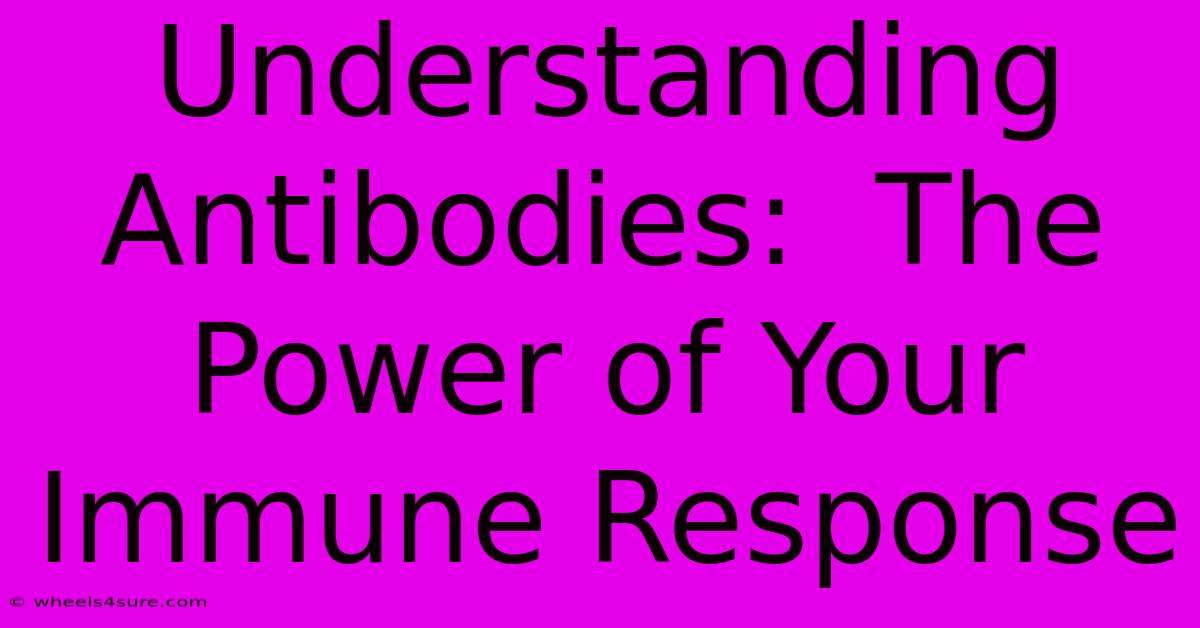Understanding Antibodies: The Power Of Your Immune Response

Table of Contents
Understanding Antibodies: The Power of Your Immune Response
Our bodies are constantly under attack from viruses, bacteria, and other harmful invaders. But we don't usually succumb to every sniffle or scratch. That's thanks to our incredible immune system, and a key player in its arsenal: antibodies. This article will delve into the fascinating world of antibodies, exploring their structure, function, and crucial role in protecting us from disease.
What are Antibodies?
Antibodies, also known as immunoglobulins (Ig), are Y-shaped proteins produced by specialized immune cells called plasma cells. These plasma cells are themselves derived from B cells, a type of white blood cell. Antibodies are specifically designed to target and neutralize harmful substances, which are known as antigens. Antigens can be anything from viral proteins to bacterial toxins to even pollen.
Think of antibodies as highly specialized guided missiles. Each antibody is uniquely crafted to bind to a specific antigen, like a lock and key. This precision ensures that the immune response is targeted and effective.
The Structure of an Antibody
Understanding the structure of an antibody helps to understand its function. Each antibody molecule consists of:
- Two heavy chains: These longer chains determine the antibody's class (IgG, IgM, IgA, IgE, or IgD).
- Two light chains: These shorter chains contribute to antigen binding.
- Variable region: This region at the tip of the "Y" is highly variable and responsible for antigen recognition. The unique amino acid sequence in this region allows for the incredible specificity of antibodies.
- Constant region: This region is relatively consistent across different antibodies of the same class and mediates effector functions (discussed below).
How Antibodies Work: Neutralizing the Threat
Once an antibody encounters its target antigen, it binds with high affinity. This binding triggers several crucial mechanisms:
1. Neutralization:
Antibodies can directly neutralize pathogens by blocking their ability to infect cells. Think of it as physically preventing the virus or bacteria from attaching to and entering host cells.
2. Opsonization:
Antibodies can coat pathogens, making them more easily recognized and engulfed by phagocytic cells (like macrophages and neutrophils) – cells that essentially eat and destroy invaders. This process is known as opsonization.
3. Complement Activation:
Antibodies can trigger the complement system, a cascade of proteins that leads to pathogen lysis (destruction) and inflammation. This is a crucial part of the innate immune response working in concert with the adaptive immune response of antibodies.
4. Antibody-Dependent Cell-mediated Cytotoxicity (ADCC):
Antibodies can mark infected cells for destruction by natural killer (NK) cells. NK cells recognize the antibody bound to the infected cell and release cytotoxic granules, leading to the destruction of the infected cell.
Antibody Types and Their Roles
There are five main classes of antibodies, each with distinct roles:
- IgG: The most abundant antibody in the blood, providing long-term immunity.
- IgM: The first antibody produced during an infection, playing a crucial role in early immune responses.
- IgA: Found in mucosal secretions (like saliva and tears), protecting the body's surfaces.
- IgE: Involved in allergic reactions and defense against parasites.
- IgD: Its function is still not fully understood, but it's thought to play a role in B cell activation.
Antibodies and Immunity: The Bigger Picture
Antibodies are not only crucial for fighting off infections; they're also central to the development of immunological memory. After an infection, some B cells differentiate into long-lived memory B cells. These cells can quickly produce large amounts of antibodies upon re-exposure to the same antigen, providing rapid and effective protection against future encounters. This is the basis of vaccination – inducing the production of memory B cells and thus long-term immunity without causing disease.
Understanding Antibodies: Key Takeaways
Understanding antibodies is fundamental to understanding our immune system. Their intricate structure and diverse functions are essential for protecting us from a vast array of pathogens. From neutralizing viruses to activating the complement system, antibodies are powerful weapons in our body's fight for survival. Further research continues to reveal the complexities of this vital part of our immune response, leading to advancements in disease prevention and treatment.

Thank you for visiting our website wich cover about Understanding Antibodies: The Power Of Your Immune Response. We hope the information provided has been useful to you. Feel free to contact us if you have any questions or need further assistance. See you next time and dont miss to bookmark.
Featured Posts
-
Hardik Pandyas Net Worth Source Of Income Breakdown
Apr 07, 2025
-
Die Son Koerant In Depth News Analysis
Apr 07, 2025
-
Dua Lipas Dad A Role Model
Apr 07, 2025
-
Moms Pass Financial Independence Starts Now
Apr 07, 2025
-
Icc Net Worth A Detailed Report
Apr 07, 2025
